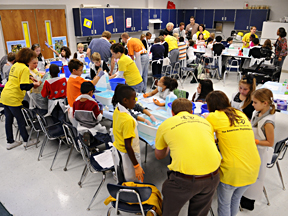Claire Bevensee and Michael Poe had the pulse of their third-grade classmates at Deer Valley Elementary School in Hoover after a visit by faculty and students from the UAB Department of Physiology and Biophysics. The group of 40 students had the rare opportunity to touch and watch real sheep lungs in action.
 |
| More than 20 UAB physiology students and faculty spent two days earlier this month teaching third-graders at Deer Valley Elementary how their body processes the air it breathes. The outreach project was part of Physiology Understanding (PhUn) Week. |
“Everybody thought it was cool and gross,” Bevensee says. “The lungs were kind of squishy and gross. It’s really fun getting to learn about new stuff.”
The students were given that opportunity as part of Physiology Understanding (PhUn) Week, an event established by the American Physiological Society that invites its members to volunteer for outreach programs in K-12 classrooms. More than 20 faculty, staff and students from physiology and biophysics volunteered to teach Deer Valley students about science and specifically about how our bodies consume and use the air we breathe.
“This was a great opportunity for us to share our knowledge of physiology and show these young students how it affects their daily lives,” says Edlira Clark, Ph.D., a postdoc in physiology and coordinator of the Deer Valley Elementary School outreach. “I’ve never had to teach third graders — or adults, actually. It was easy putting it all together, and it was definitely fun. I’ve never had such high adrenaline before in my life.”
Faculty, staff and students spent two days teaching at Deer Valley earlier this month, and their program will be available at McWane Center in Birmingham Saturday, Nov. 27. Community Outreach and Development Director Michael Wyss, Ph.D., will help with the program.
Wyss, who also was part of the Deer Valley programs, says there are several reasons these service-learning opportunities are valuable to the community, faculty and students.
“First, service-learning is important for our students, so that they can understand how to communicate information in their classroom,” Wyss says. “Second, these students and postdocs are all going to be in very privileged professions when they get out of school, and they’ll be in a position where they can be great advocates for education, which we certainly need today. And finally, what it does for the children is give them an opportunity to learn a little about scientists. And they’re going to say ‘science is a viable career opportunity for me in the future.’ Basic sciences are the driving force in the progress of biomedical sciences in the world.”
Students had the opportunity to look at lung tissue under a magnifying glass, construct and use a lungometer and dress a scientist in addition to pumping up the sheep lungs with a bicycle pump.
“This was different from a normal science class,” said Poe, one of the third-grade students. “I was learning about how the organs work, and we got to touch some of the sheep organs. That was my favorite part.”
The dress a scientist activity also was a hit. Its purpose was to help break down some of the misconceptions on what a scientist is supposed to look like.
“Many kids may think all scientists look like Einstein — males with moustaches and crazy hair,” Clark says. “This exercise shows them that scientists come in many shapes, sizes and personalities.”
Clark set up the outreach project earlier this fall at the urging of Dale Benos, Ph.D., her mentor. Benos, chair of the Department of Physiology and Biophysics, passed away Thursday, Oct. 7.
Clark says she hopes the department will continue to participate in PHUN Week activities in the future as a way to honor Benos.
“He was the one who said, ‘Let’s do this,’” Clark says. “He loved physiology and he loved teaching. If we can teach kids about physiology, you can never start too early. I can’t think of a more appropriate way to honor him.”
Clark may have organized the event, but she says the support from the department and the willingness of so many to volunteer is what made it a success. “This couldn’t have happened without the help of our volunteers,” Clark says. “I bounced a lot of ideas off of Dr. Wyss and received so much help from our students. We’ve worked together great as a team, and it’s truly been fun.